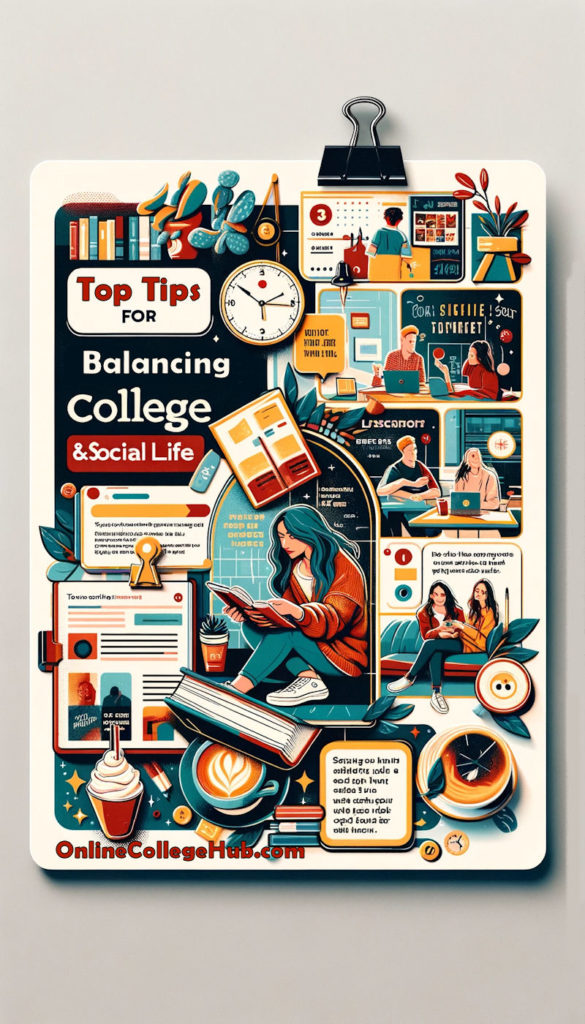
How to Balance College and Social Life?
Why finding a balance between your academic and social life so crucial?
For starters, college is not just about earning a degree; it’s a transformative experience that shapes your personal and professional future. A well-balanced college life ensures that you excel academically while also developing essential life skills through social interactions.
The Academic Perspective: From my experience, a balanced approach leads to more effective learning. When you’re not overwhelmed by an unmanageable course load, you have the mental space to absorb and reflect on what you’re learning. This doesn’t just boost your grades; it fosters a deeper understanding and appreciation of your field of study.
Mental Health Matters: Balancing your academic and social life is also key to maintaining good mental health. College can be stressful, and without a healthy outlet, this stress can lead to burnout. Social activities provide a much-needed escape, giving you a chance to recharge and return to your studies with renewed energy and focus.
Personal Growth: Beyond academics, college is a time for personal growth. Social interactions, from group projects to campus events, help you build essential soft skills like communication, teamwork, and empathy. These are skills that you’ll carry with you long after graduation, and they’re just as important as your academic achievements.
Building a Network: Finally, your social life in college is the foundation of your professional network. The friendships and connections you make now can open doors for you in the future. It’s about finding a balance that allows you to build these relationships without compromising your academic responsibilities.
Time Management Strategies
Managing time effectively is the cornerstone of achieving balance in college. Here are some strategies that worked wonders for me and my peers:
1. Create a Realistic Schedule: Your planner is your best friend. Map out your classes, study time, assignments, and social events. Be realistic about how much time each activity requires. Remember, it’s okay to leave some breathing room for unexpected tasks or downtime.
2. Prioritize Wisely: Not all tasks are created equal. Learn to prioritize based on urgency and importance. For instance, preparing for a major exam should take precedence over a casual get-together.
3. Set Achievable Goals: Break down larger tasks into smaller, manageable goals. This makes your workload seem less daunting and provides a sense of accomplishment as you tick off items from your list.
4. Utilize Time Management Tools: There are fantastic apps and tools out there for time management. From digital calendars to task management apps like Trello or Asana, find the one that suits your style.
5. Avoid Procrastination: Easier said than done, I know. But try to tackle your tasks as soon as possible. Procrastination only leads to stress and last-minute cramming, which isn’t conducive to learning or enjoying your social life.
Making the Most of Your Social Life
Your social life in college is as important as your academic life. Here’s how to make the most of it without overcommitting:
1. Quality Over Quantity: It’s not about how many events you attend, but the value they bring. Choose activities that genuinely interest you or help you unwind. Sometimes, a quiet evening with close friends is more rewarding than a big party.
2. Combine Social and Academic Activities: Join study groups or become part of clubs that align with your interests. This way, you’re building relationships while also contributing to your academic growth.
3. Be Selective: You don’t have to attend every social event. Select the ones that fit into your schedule without causing stress or impacting your academic responsibilities.
4. Explore Diverse Activities: College offers a plethora of activities. Try out different clubs, sports, and events. This not only broadens your social circle but also helps you discover new interests.
5. Remember to Unplug: While social media is a great way to stay connected, it can also be a major time-sink. Allocate specific times for social media and stick to them to avoid endless scrolling.
In the next sections, we’ll explore how to set boundaries and the importance of self-care in maintaining this delicate balance. Stay tuned for more insights on navigating your college journey with grace and efficiency.

Setting Boundaries and Saying No
One of the hardest yet most crucial skills to master in college is the art of setting boundaries. Here’s how you can do it:
1. Understand Your Limits: Recognize that there are only so many hours in a day and you have a limit to what you can take on. It’s not just okay, but necessary, to say no when you’re stretched too thin.
2. Communicate Clearly: When you need to decline an invitation or a request, be honest and direct. A simple, “I have a major assignment due, so I can’t make it,” is often enough. People generally understand, as they’re likely in a similar boat.
3. Schedule Downtime: Just as you schedule study time and social events, schedule time for yourself. This might mean time alone, pursuing hobbies, or just relaxing. This is not wasted time; it’s an essential part of maintaining your mental and emotional health.
4. Respect Your Study Time: Treat your study time with the same importance as a class or a job. When it’s time to study, turn off distractions and focus. This will make your study sessions more productive, freeing up time for social activities.
5. Be Mindful of Peer Pressure: It’s easy to be swayed by friends or roommates. Remember, it’s your time and your college experience. Making choices that are right for you is not only smart but also necessary for your well-being.
Self-Care and Stress Management
Self-care is not a luxury; it’s an essential part of keeping your life in balance. Here are some tips:
1. Regular Exercise: Physical activity is a great stress reliever. Whether it’s a gym session, a jog, or a yoga class, find something that gets you moving. Even a brisk walk can do wonders for your mood and energy levels.
2. Healthy Eating Habits: It’s tempting to rely on fast food and caffeine, but nutritious meals can significantly impact your energy and concentration levels. Try to incorporate fruits, vegetables, and balanced meals into your diet.
3. Get Adequate Sleep: Pulling all-nighters might seem like a part of the college experience, but regular sleep deprivation can be detrimental. Aim for 7-8 hours of sleep to ensure you’re well-rested and alert.
4. Mindfulness and Relaxation: Techniques such as meditation, deep breathing exercises, or journaling can help manage stress. Even a few minutes a day can make a significant difference.
5. Seek Help When Needed: If you’re feeling overwhelmed, don’t hesitate to seek support. Most colleges offer counseling services, and there’s no shame in asking for help. Sometimes, just talking about your struggles can lighten the load.
In the next section, we will discuss the importance of reaching out for support and utilizing campus resources to help maintain this balance.
Seeking Support When Needed
Never underestimate the power of a strong support system during your college years:
1. Utilize Campus Resources: Most colleges are equipped with a variety of resources — from academic advisors to mental health counselors. Familiarize yourself with these services and don’t hesitate to use them.
2. Reach Out to Peers: Sometimes, your fellow students can be your greatest support. They understand exactly what you’re going through. Form study groups, share tips, or just lend an ear to each other.
3. Stay Connected with Family and Friends: Regular check-ins with family and friends outside college can provide a comforting perspective and a sense of continuity amidst the college chaos.
4. Find Mentors: Look for mentors among your professors, senior students, or professionals in your field of study. Their experience and guidance can be invaluable in navigating your college journey.
5. Balance is Dynamic: Remember, the right balance today might need adjustment tomorrow. Be open to changing your strategies as your circumstances evolve.
College is not just about grades or the number of friends you make; it’s about growing into your best self, equipped with knowledge, experiences, and lifelong relationships. The strategies that worked for me or your peers might need tweaking to fit your personal rhythm. The key is to stay flexible and forgiving with yourself.
Embrace this time with open arms and an open mind. The challenges are real, but so are the opportunities. With the right balance, your college years can be some of the most rewarding and memorable years of your life.
If you found this post helpful or have your own tips and experiences to share, I’d love to hear from you in the comments below! Your insights could be the guiding light for someone else striving for that perfect balance. Remember to share this post with your friends and classmates who might also be navigating these same challenges in their college journey.